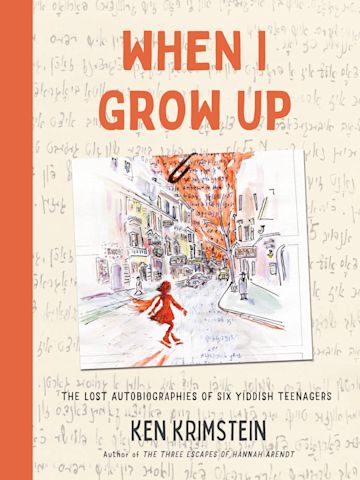 When I Grow Up: The Lost Autobiographies of Six Yiddish Teenagers by Ken Krimstein is a collection of “lost autobiographies” that breaks with many norms readers might expect from autobiographical works. And I predict YA literature readers will be fascinated by the power of these young people’s words and experiences and the “author’s” visual interpretation of their memoirs. Continue reading
When I Grow Up: The Lost Autobiographies of Six Yiddish Teenagers by Ken Krimstein is a collection of “lost autobiographies” that breaks with many norms readers might expect from autobiographical works. And I predict YA literature readers will be fascinated by the power of these young people’s words and experiences and the “author’s” visual interpretation of their memoirs. Continue reading
WOW Recommends
WOW Recommends: Book of the Month


WOW Recommends: Time to Fly
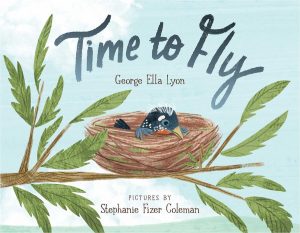 Whenever I see a new book by George Ella Lyon, I immediately take notice. Her most beloved form of writing is poetry where she provides us with eloquent lyrical verse in each of her books she delivers. I can hear her voice as I read through her books, much like the voice you hear that can be heard on YouTube videos or on her website page where you can find her reading her books and poems. In this new book, Time to Fly, I can vividly hear Lyon’s voice as she narrates a mother bird urging her last baby bird to leave the nest and learn to fly on her own. Authors who write stories where you can hear them are the types of books that I gravitate to because of their ability to be a storyteller and relay the characters’ voices brilliantly. Continue reading
Whenever I see a new book by George Ella Lyon, I immediately take notice. Her most beloved form of writing is poetry where she provides us with eloquent lyrical verse in each of her books she delivers. I can hear her voice as I read through her books, much like the voice you hear that can be heard on YouTube videos or on her website page where you can find her reading her books and poems. In this new book, Time to Fly, I can vividly hear Lyon’s voice as she narrates a mother bird urging her last baby bird to leave the nest and learn to fly on her own. Authors who write stories where you can hear them are the types of books that I gravitate to because of their ability to be a storyteller and relay the characters’ voices brilliantly. Continue reading

WOW Recommends: Luli and the Language of Tea
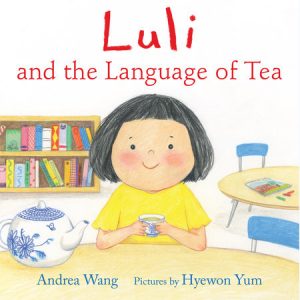 Luli and the Language of Tea opens with Luli coming into a preschool classroom with children from many cultures and countries. Their parents are attending an ESL class next door. The text reads, “The playroom was quiet./ Luli couldn’t speak English./ Neither could the others./ All around the room, children played alone.” Continue reading
Luli and the Language of Tea opens with Luli coming into a preschool classroom with children from many cultures and countries. Their parents are attending an ESL class next door. The text reads, “The playroom was quiet./ Luli couldn’t speak English./ Neither could the others./ All around the room, children played alone.” Continue reading

WOW Recommends: The Last Cuentista
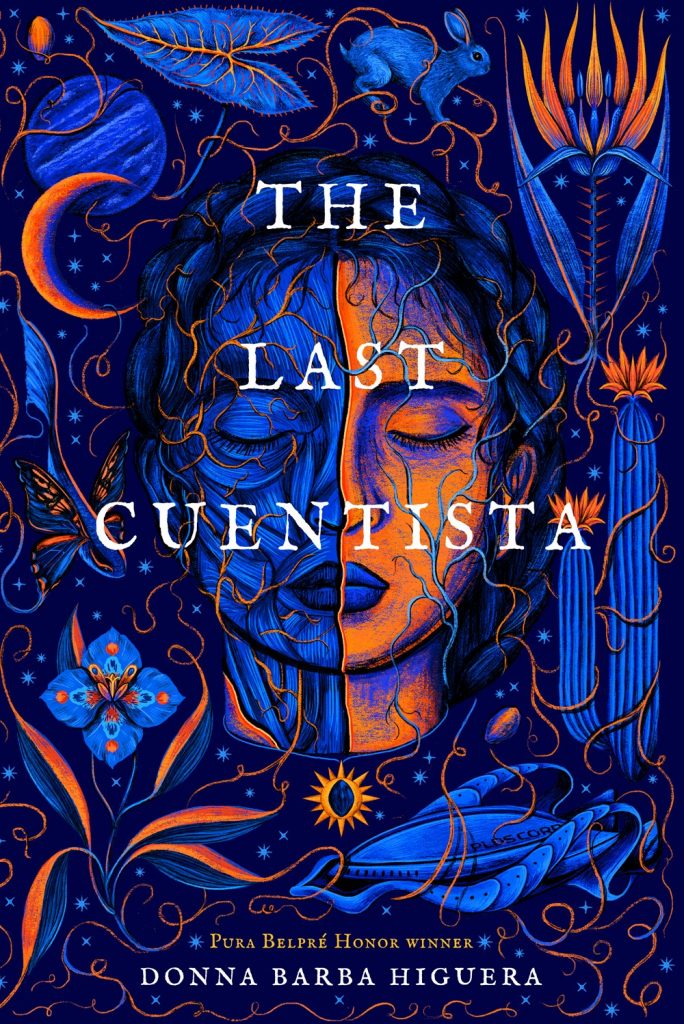 Había una vez there was a hard-working WOW Center Student Library Aide who was tasked with processing books. She did not identify as a reader, and so she could handle large numbers of books without temptation–until The Last Cuentista by Donna Barba Higuera caught her eye. Did her supervisor look the other way as this book trailed the student worker through her assigned duties at the front desk, while training new co-workers and as she prepped for her eventual departure upon graduation? Yes, I did. I did because I also read The Last Cuentista and know how transportive the story is. Continue reading
Había una vez there was a hard-working WOW Center Student Library Aide who was tasked with processing books. She did not identify as a reader, and so she could handle large numbers of books without temptation–until The Last Cuentista by Donna Barba Higuera caught her eye. Did her supervisor look the other way as this book trailed the student worker through her assigned duties at the front desk, while training new co-workers and as she prepped for her eventual departure upon graduation? Yes, I did. I did because I also read The Last Cuentista and know how transportive the story is. Continue reading

WOW Recommends: Wishes
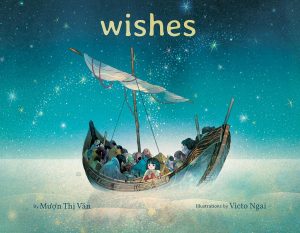 Wishes is a compelling story about a Vietnamese family’s escape to find a new home across the world and the impact of their journey on one of the youngest children. The story is told through the young girl’s experiences and the wishes made by inanimate objects such as the rice packets that wishes they were deeper and the clock at the departure that wishes it was slower. The story is inspired by the author’s autobiographical accounts of her personal fears and experiences as a young immigrant and refugee in the 1980s when she and her family were forced to leave Vietnam. The story is seamlessly told in prose with beautiful illustrations resembling each wish along her journey. Each illustration and wish leads to her final wish—for a place to call home. Continue reading
Wishes is a compelling story about a Vietnamese family’s escape to find a new home across the world and the impact of their journey on one of the youngest children. The story is told through the young girl’s experiences and the wishes made by inanimate objects such as the rice packets that wishes they were deeper and the clock at the departure that wishes it was slower. The story is inspired by the author’s autobiographical accounts of her personal fears and experiences as a young immigrant and refugee in the 1980s when she and her family were forced to leave Vietnam. The story is seamlessly told in prose with beautiful illustrations resembling each wish along her journey. Each illustration and wish leads to her final wish—for a place to call home. Continue reading

WOW Recommends: Child of the Flower-Song People: Luz Jiménez, Daughter of the Nahua
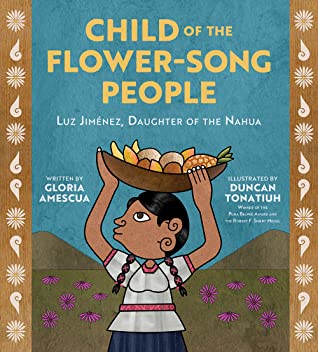 As a reader and educator who is drawn to the artistry of Duncan Tonatiuh as well as stories of indigenous people, I immediately welcomed Child of the Flower-Song People: Luz Jiménez, Daughter of the Nahua into my library. Both the author and subject were new to me, and after many close readings I am still finding multiple reasons to appreciate the poetic text and research of Gloria Amescua, the uniquely created illustrations of Tonatiuh, and the biography of a woman, Luz Jiménez, whose life is both a historical monument and an example of being true to one’s cultural identity. Continue reading
As a reader and educator who is drawn to the artistry of Duncan Tonatiuh as well as stories of indigenous people, I immediately welcomed Child of the Flower-Song People: Luz Jiménez, Daughter of the Nahua into my library. Both the author and subject were new to me, and after many close readings I am still finding multiple reasons to appreciate the poetic text and research of Gloria Amescua, the uniquely created illustrations of Tonatiuh, and the biography of a woman, Luz Jiménez, whose life is both a historical monument and an example of being true to one’s cultural identity. Continue reading

WOW Recommends: Freedom Swimmer
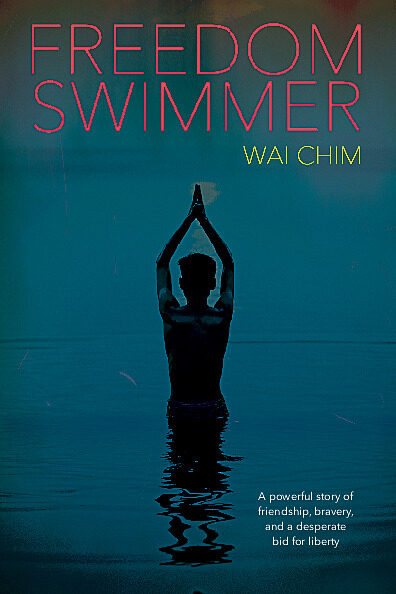 I recommend Freedom Swimmer because of the distinctiveness of the topic as well as the literary quality. This historical fiction novel powerfully captures life for children under the Communist Party during China’s Cultural Revolution. The book is inspired by events that transpired in the life of the author’s father after Mao Zedong seized control of the of government from his intellectual and political adversaries within the Communist Party of China. Continue reading
I recommend Freedom Swimmer because of the distinctiveness of the topic as well as the literary quality. This historical fiction novel powerfully captures life for children under the Communist Party during China’s Cultural Revolution. The book is inspired by events that transpired in the life of the author’s father after Mao Zedong seized control of the of government from his intellectual and political adversaries within the Communist Party of China. Continue reading

WOW Recommends: Hunting by Stars
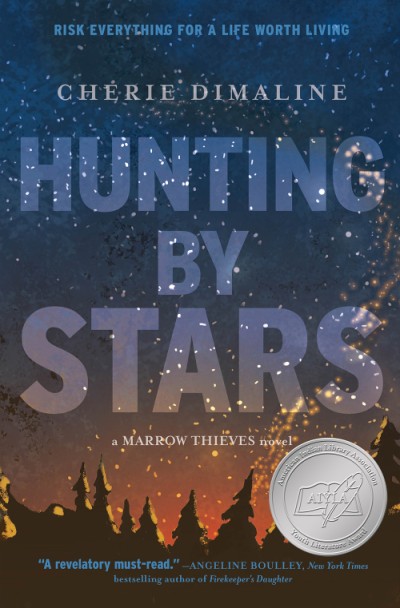 Hunting by Stars, a YA novel by Métis writer Cherie Dimaline, was released as a sequel to The Marrow Thieves, which was honored with many awards. The protagonist, French, of the new novel never expected to see his brother, Mitch, again. After witnessing his brother’s abduction by the Recruiters at the beginning of The Marrow Thieves, French thinks surely they had taken Mitch to die at the new kind of residential school, where Indigenous peoples are harvested for their bone marrow. That’s where the dreams live, and in this dystopian future, the only people who are still able to dream are Indigenous peoples of North America. All others suffer a sickness because of their lack of dreaming. Mitch survives because he becomes one of them after capture, a Recruiter, working on the side of those abducting and harvesting Indigenous peoples. When French and Mitch reunite, it is not a happy reunion, as French has himself been abducted and taken to the school, where he realizes his beloved brother is alive but also, in a sense, his enemy. French has to grapple with the pain of choosing who to fight for, who to protect and support – family by blood or by bond – and how to escape from the school and reunite with his chosen family. Continue reading
Hunting by Stars, a YA novel by Métis writer Cherie Dimaline, was released as a sequel to The Marrow Thieves, which was honored with many awards. The protagonist, French, of the new novel never expected to see his brother, Mitch, again. After witnessing his brother’s abduction by the Recruiters at the beginning of The Marrow Thieves, French thinks surely they had taken Mitch to die at the new kind of residential school, where Indigenous peoples are harvested for their bone marrow. That’s where the dreams live, and in this dystopian future, the only people who are still able to dream are Indigenous peoples of North America. All others suffer a sickness because of their lack of dreaming. Mitch survives because he becomes one of them after capture, a Recruiter, working on the side of those abducting and harvesting Indigenous peoples. When French and Mitch reunite, it is not a happy reunion, as French has himself been abducted and taken to the school, where he realizes his beloved brother is alive but also, in a sense, his enemy. French has to grapple with the pain of choosing who to fight for, who to protect and support – family by blood or by bond – and how to escape from the school and reunite with his chosen family. Continue reading

WOW Recommends: Unspeakable
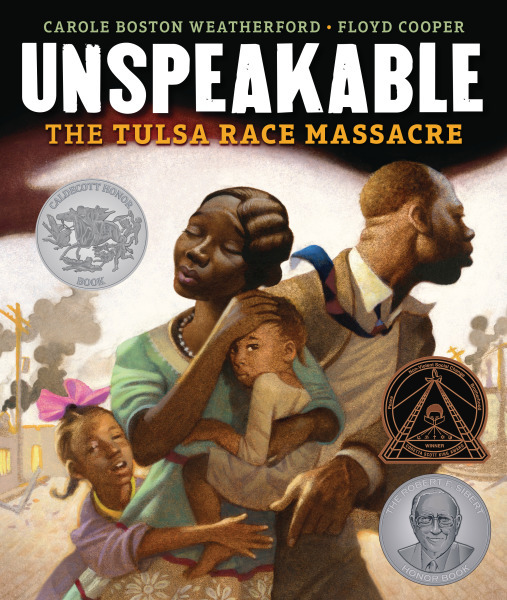 Unspeakable: The Tulsa Race Massacre chronicles the murderous hostility, humiliation and hope of this largely suppressed historical event in United States. The devastation occurred in 1921 when a white mob attacked the Black community in Tulsa, Oklahoma. This third person informational text narrates the incidents that occurred in one of the worst racially violent cases in U.S. Tulsa, during this time, was a prosperous segregated town, where descendants of “Black Indians, from formerly enslaved people, and from Exodusters” thrived in their Greenwood community, once known as Black Wallstreet. “Once upon a time” near Tulsa, is a phrase that is eloquently repeated to depict the prosperity that the people in the Greenwood community created. Then one day, the massacre stemmed from one elevator ride where a 17-year-old white elevator operator accused a 19-year old Black shoeshine man of “assault for simmering hatred to boil over.” This incident resulted in 300 Black people who died, and more than 8,000 left homeless, “…hundreds of businesses were reduced to ash.” It took over 75 years to launch an investigation, which uncovered that “police and city officials had plotted with the angry white mob to destroy the nation’s wealthiest Black community.” Continue reading
Unspeakable: The Tulsa Race Massacre chronicles the murderous hostility, humiliation and hope of this largely suppressed historical event in United States. The devastation occurred in 1921 when a white mob attacked the Black community in Tulsa, Oklahoma. This third person informational text narrates the incidents that occurred in one of the worst racially violent cases in U.S. Tulsa, during this time, was a prosperous segregated town, where descendants of “Black Indians, from formerly enslaved people, and from Exodusters” thrived in their Greenwood community, once known as Black Wallstreet. “Once upon a time” near Tulsa, is a phrase that is eloquently repeated to depict the prosperity that the people in the Greenwood community created. Then one day, the massacre stemmed from one elevator ride where a 17-year-old white elevator operator accused a 19-year old Black shoeshine man of “assault for simmering hatred to boil over.” This incident resulted in 300 Black people who died, and more than 8,000 left homeless, “…hundreds of businesses were reduced to ash.” It took over 75 years to launch an investigation, which uncovered that “police and city officials had plotted with the angry white mob to destroy the nation’s wealthiest Black community.” Continue reading

WOW Recommends: Borders
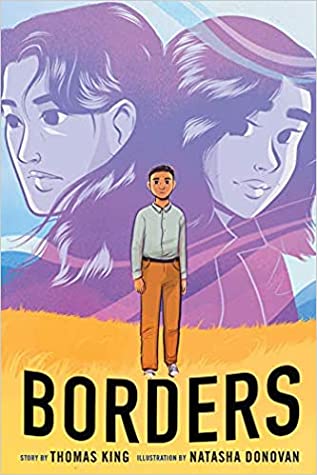 Questions of sovereignty, citizenship, and who gets to decide are the central issues in Borders (2021), a graphic novel with expressive colorful illustrations representing a realistic sensibility. A first-person narrative told from the perspective of a young boy, readers follow along on a road trip between the Blackfoot Reserve in Canada to the border between Canada and the United States. Upon reaching the border, those wishing to cross the border either for returning to their own country or entering the visiting country must declare their citizenship. When asked for her citizenship, the boy’s mother responds, “Blackfoot.” This creates a dilemma for the border guards, as she is expected to answer either “Canadian” or “USA.” Because she refuses to claim any citizenship other than her tribal affiliation, the boy and his mother are not allowed in the USA, and are turned back. But once they return to the border crossing into Canada, they not allowed into Canada because the boy’s mother responds in the same way when asked her citizenship. Continue reading
Questions of sovereignty, citizenship, and who gets to decide are the central issues in Borders (2021), a graphic novel with expressive colorful illustrations representing a realistic sensibility. A first-person narrative told from the perspective of a young boy, readers follow along on a road trip between the Blackfoot Reserve in Canada to the border between Canada and the United States. Upon reaching the border, those wishing to cross the border either for returning to their own country or entering the visiting country must declare their citizenship. When asked for her citizenship, the boy’s mother responds, “Blackfoot.” This creates a dilemma for the border guards, as she is expected to answer either “Canadian” or “USA.” Because she refuses to claim any citizenship other than her tribal affiliation, the boy and his mother are not allowed in the USA, and are turned back. But once they return to the border crossing into Canada, they not allowed into Canada because the boy’s mother responds in the same way when asked her citizenship. Continue reading
